Back in 2011, the analyst Peter Sondergaard famously told the business world, “Information is the oil of the 21st century, and analytics is the combustion engine.” Since then, we’ve entered a new age of data harvesting, one where your social media profile, GPS coordinates, and even your face are fair game for corporations. The holy grail, however, isn’t going to be someone’s search history or shampoo preference—it’ll be their DNA
That’s what authors Jay Webb and Biju Parekkadan foresee in their recent graphic novel, Legend of Sumeria. In their vision of a near-future dystopian society, a corporation called Nyima acquires a DNA ancestry company (think 23andMe or Ancestry.org), along with its huge database of genetic profiles. From there, all of that data is used to create a new social media platform-cum-genetic security system called the SEQ Network, which recommends products, services, and even romantic partners based on what inferences about people can be gleaned from their genetic profiles, and tracking everything—from users’ banking transactions to their location—using their DNA signatures.
It only took four months after Legend’s publication for their predictions to start coming true.
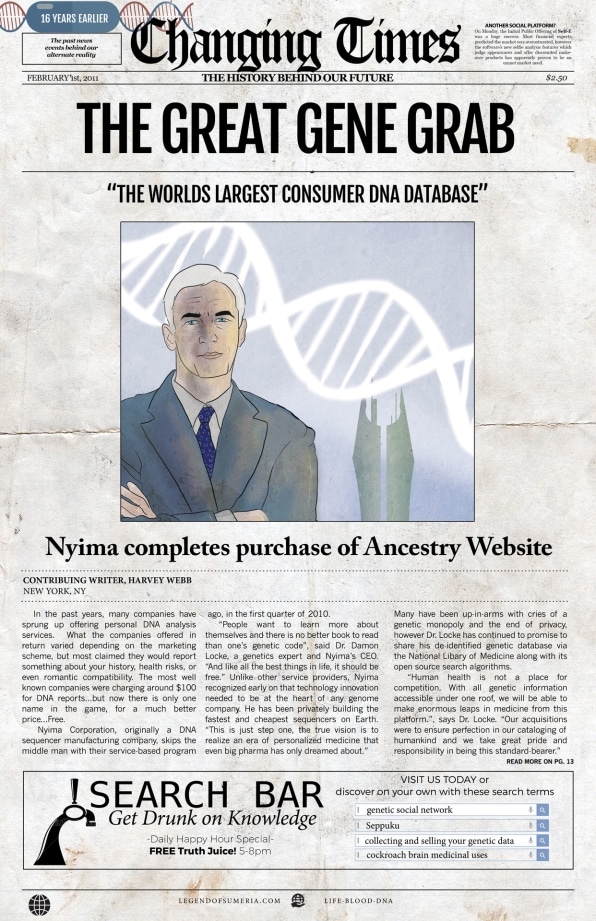
On July 25, 2018, the major pharmaceutical company Glaxo-SmithKline announced that it had bought a $300 million stake in 23andMe, the do-it-yourself DNA sequencing service. The new investment will allow GSK to access 23andMe’s DNA database to ostensibly develop new drugs, but there’s a lot more to be gained from this largely untapped well of biometric data.
Legend provides a blueprint for what comes next: the erasure of DNA privacy, a new industry where faux genetic science drives marketing, and a paradigm shift in how society views our genetic “destiny.”
For Parekkadan, a professor of biomedical engineering at Rutgers University, the book isn’t just an exercise in science fiction but an urgent thought experiment. “We wanted to take ‘disruptive’ technologies to the extreme–paint a realistic world where genetics was embedded in society [ . . . ]and see how society would react,” he says. “We found that genetics in this world served as a ‘wedge,’ creating a new normal that tolerated discrimination, inequality, and even corruption with a traumatic loss of identity and individuality.”
It’s already beginning to happen.
Your DNA won’t stay “anonymous”
The SEQ Network in Legend of Sumeria is the wet dream of every modern tech company: It’s Facebook, Google, Venmo, Tinder, Twitter, Amazon Echo, and Apple Pay rolled into one, making opting-out nearly unthinkable. Funnily enough, one of the major factors that allowed the fictional SEQ to get a stranglehold on the market was the public’s frustration with identity theft scandals, where hackers scoop up users’ sensitive data from vulnerable corporate databases. Nyima’s answer? Give us all your personal data and DNA, and we’ll make sure no one else can steal your life.
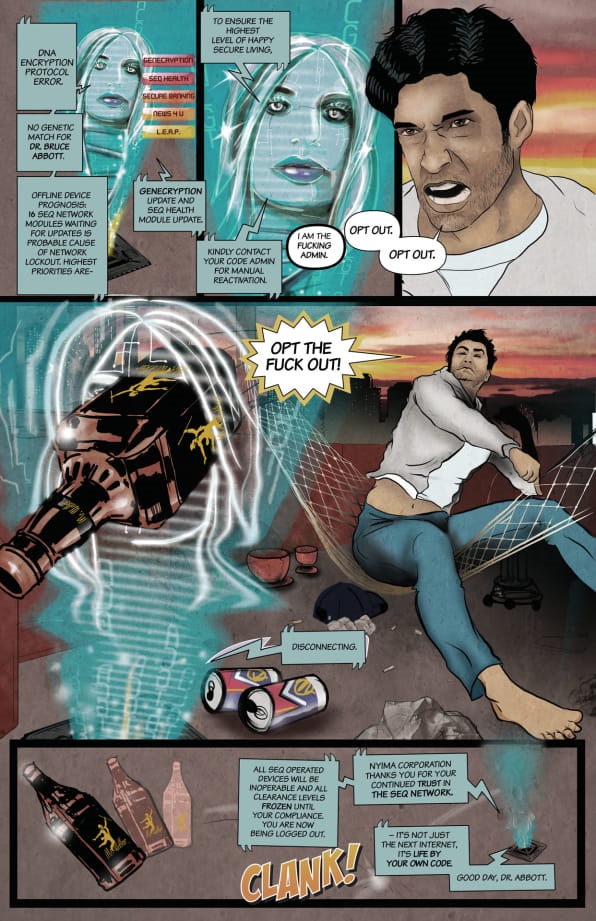
But here’s the thing: Even if people don’t consent to giving up their DNA and identities, that’s not going to stop companies from doing it anyway. A 2013 study found that de-identified DNA could be matched with its owner by looking at the Y chromosome and doing a relatively simple search of publicly available DNA databases, while a recent study by Columbia University proved you can track down someone using only their DNA and some basic info, even if they’re not in a database. In fact, the same techniques outlined by Columbia were used to catch the elusive Golden State Killer, Joseph James DeAngelo.
According to Ifeoma Ajunwa, a professor at Cornell’s Industrial and Labor Relations School, “The concept of anonymity [when it comes to DNA] is completely disingenuous. It’s inaccurate. Your DNA is you. You can’t really be anonymous with your DNA.”
The implications of these findings are alarming: The more DNA and personal data companies collect, the more gaps they’ll be able to fill in. Once all that data can be attached to a single genetic profile, we’ll be on track to seeing our own version of the SEQ Network become a reality, as well as the death of individual privacy.
The stories DNA tells (or doesn’t)
Gene-based marketing dominates society in Legend of Sumeria, but the public still has difficulty distinguishing between what’s truly influenced by their genetics and what’s faux science, leaving them at the whim of corporate messaging.
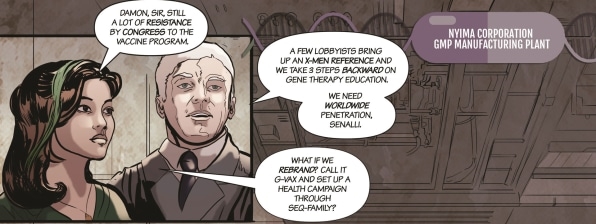
Genomics is a complicated field, one with a lot of misunderstandings. Take, for example, the slew of stories that came out last year erroneously claiming that astronaut Scott Kelly returned from space with 7% of his DNA altered, or the viral news story that intelligence is inherited from your mother. These kinds of misunderstandings present an opportunity for marketers, who have a history of spinning and twisting scientific findings to their advantage, such as the Hershey and Mars-sponsored studies that turned dark chocolate into a health food.
In an email, Webb told me that something much more profound will happen if the DNA marketing techniques shown in Legend come to fruition. “In reality, the issues will arise when people’s genetic data is being used in ways that they are not aware of, like manipulative marketing or political propaganda using faux science . . . to categorize and sell ideas and products to humans by stating their DNA dictates that it is ‘good for them’ could become a frightening level of power for those in control of the data.”
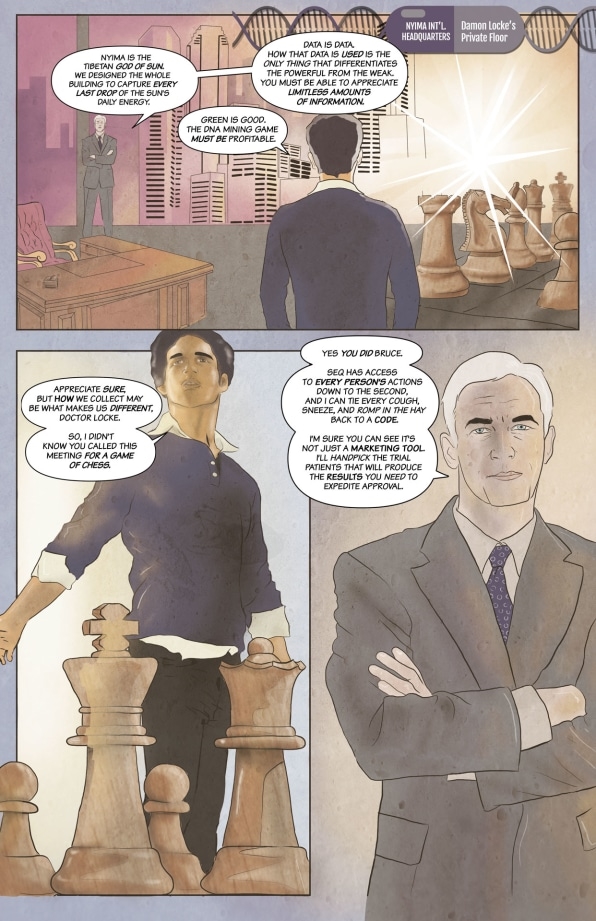
We’re already seeing these kinds of DNA-based marketing techniques in action: Nestle has begun an initiative in Japan called the “Nestle Wellness Ambassador program” that involves a DNA test to help participants live better lives (including building a better diet). But some caution that these genetics-based dietary programs can easily devolve into pseudoscience. According to Marion Nestle (no relation to the food company), a nutrition professor at New York University, “Nestle’s program is designed to personalize diets in ways unlikely to be necessary. If we think something will make us healthier, we are likely to feel healthier.”
One quote in particular sums up Legend of Sumeria’s vision of the future: “DNA tells the only stories that will ever matter.” They’re the words of Damon Locke, the fictional CEO of Nyima, the monopolistic corporation at the center of the story’s dystopia. On the one hand, he’s telling the truth—our DNA is a fundamental part of our health, our past, and ourselves. On the other hand, it’s the lie that a corporation like Nyima can use to convince consumers that they know us better than we know ourselves.
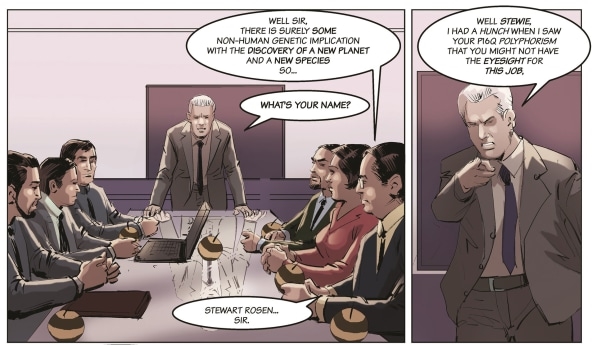
The real-life debate over whether our DNA or our environment determines our fate has recently reignited, giving birth to books like Blueprint: How DNA Makes Us Who We Are, in which behavioral geneticist Robert Plomin claims “that DNA is the most important factor shaping who we are. Our families, schools, and the environment around us are important, but they are not as influential as our genes.”
Meanwhile, psychologists such as Steven J. Heine argue that the whole discussion surrounding the influence of genetics is rife with psychological biases that keep us locked into the narrative that our genes are controlling our lives. In his book DNA Is Not Destiny, he claims that far too many people are “genetic fatalists,” and that there is very rarely a direct correlation between genes and a person’s behavior.
At its most basic level, Legend of Sumeria’s dystopian vision is built on convincing the public that their DNA is their story, not just a part of it, then convincing them to hand control of that story to corporations like Nyima, who become the sole interpreters of it. It’s just a graphic novel, a fantasy, but it’s also a vivid warning of a reality that is being written right now.
Chris Mahon (@DeadmanMu) is a pop culture writer, speaker, and author.
(37)